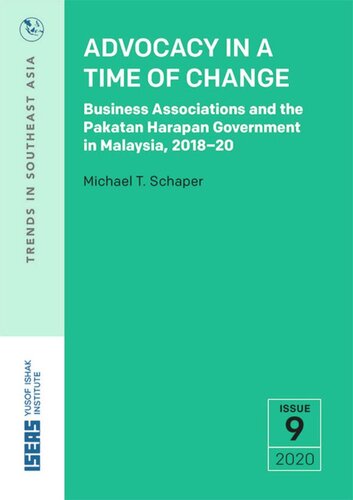

Most ebook files are in PDF format, so you can easily read them using various software such as Foxit Reader or directly on the Google Chrome browser.
Some ebook files are released by publishers in other formats such as .awz, .mobi, .epub, .fb2, etc. You may need to install specific software to read these formats on mobile/PC, such as Calibre.
Please read the tutorial at this link: https://ebookbell.com/faq
We offer FREE conversion to the popular formats you request; however, this may take some time. Therefore, right after payment, please email us, and we will try to provide the service as quickly as possible.
For some exceptional file formats or broken links (if any), please refrain from opening any disputes. Instead, email us first, and we will try to assist within a maximum of 6 hours.
EbookBell Team

0.0
0 reviewsThere are at least 80–100 business associations (such as chambers of commerce or industry-specific bodies) in Malaysia today, representing over 600,000 firms. In February–April 2020, a range of chamber leaders and officers were interviewed to record their experiences of the recent Pakatan Harapan (PH) administration, and any future lessons for business associations in post GE-14 Malaysia. Few Malaysian chambers have had experience in dealing with changes of government, creating challenges when PH took office. Most associations were able to build effective working relationships with the new administration. Compared to Barisan Nasional (BN) ministers, PH ministers emphasized greater policy rigour, more evidence-based arguments, lower tolerance for corruption, and enhanced public accountability. Criticisms of PH include an early focus by some ministers on seemingly trivial issues, an initial distrust of some parts of the public service, and an inability to have all parts of the federal government work cohesively. Some future lessons that business associations have adopted are: avoid taking a partisan stance in policy debates; be prepared for some confusion and lack of clarity in the early days of any new government; expect many existing policies to remain; build relationships with both new ministers and with senior public servants; and ensure that policy positions are well researched and evidence-based. Most associations feel comfortable in adapting to the March 2020 installation of the new Perikatan Nasional administration. Changes in government have also prompted associations to review their own internal policy capacity. Interviewees suggest that chambers may need to enhance their advocacy skills, move away from racially based structures, improve their level of public transparency, become more strategic, and improve their own internal governance and management.